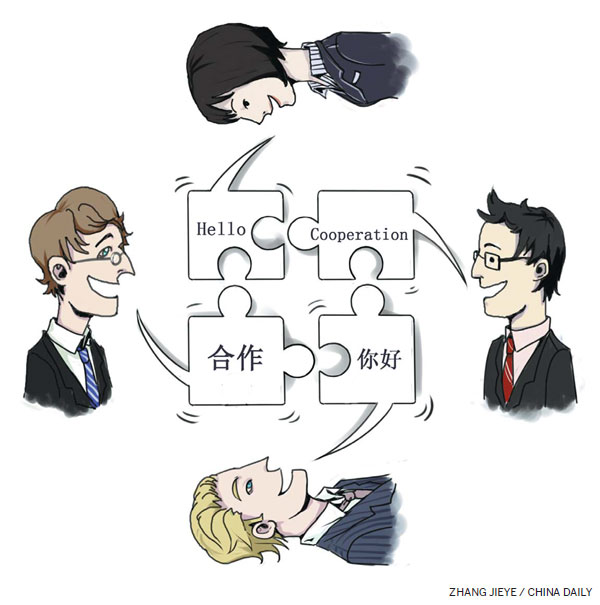How to talk business in China


Using a personal touch and correct vocabulary from the start will go far in promoting success
You have no doubt heard it before: The oil that keeps the wheels of business in China turning is 关系 (guanxi), connections.
But if you are just starting out in your business dealings with China, guanxi is likely to be in short supply or even nonexistent, and you are going to have to start building business relationships from scratch.
As with business people everywhere, your first contact with the country may well be through 电子邮件 (diànzi yóujiàn): email to prospective business associates.
Depending on your aim, the subject for the email could be: 代理商 (dàilǐshāng), British company seeks agent in China; 经销商 (jīngxiāoshāng), British company seeks distributor in China; 加工商 (jiāgōngshāng) British company seeks processor in China; 生产商 (shēngchǎnshāng), British company seeks producer in China.
The message body should include a company profile, qualifications, product features, existing partners, successful cases and website information.
After the email, follow up with a phone call at an appropriate time. This will show your sincerity in wanting to work together and to build a close relationship.
If possible, find people who know both you and your prospective associate to act as go-betweens. Choose those who are highly respected because this will greatly assist in making the business successful.
Another way to build up contact is to attend 展会 (zhanhuì), exhibitions, such as 中国进出口商品交易会 (zhongguó jìnchukou shangpin jiaoyìhuì), the China Import and Export Fair, also known as 广交会 (guangjiaohuì), the Canton Fair, held in Guangzhou every April and October. It provides a good opportunity to conduct business face to face.
In building collaboration, Chinese business people value meeting in person; we pay more attention to the person we are doing business with. Chinese business people hope to know more about the partner personally, such as personal manners, educational background, life experiences, etc. They think this also plays a significant role in business.
Unlike Westerners, Chinese business people do not rush into talks or negotiations, usually preferring to do business by having dinner together. Many important business partnerships are sealed at a dining table rather than in a meeting room. Most Chinese business people want to show respect and sincerity and soften up visitors at the dining table.
It is true that traditional Chinese ways of doing business are gradually changing, but the role of dinner should not be overlooked in building trust.
The first meeting with your potential partners may go something like the following dialogue. A is Ai Zhengying (ài Zhèngying, general manager of the Chinese Huanyu company), and B is Burke Zack (Zha Bókè, general manager of a British company).
B: Hello, General Manager Ai. I am Burke Zack from British GB Company. (ài zǒng jīnglǐ,nín hǎo! Wǒ shì Yīngguó GB gōngsīde Zhā Bókè.)
B: 艾总经理, 您好! 我是英国GB公司的瞬克。
A: General Manager Zack, I have heard a lot about you. Welcome to China. (Zhā zǒng,jiǔyǎng jiǔyǎng! Huānyíng nín lái Zhōngguó.)
A: 查总, 久仰久仰!欢迎 您 来中国。
B: I am here to talk with you about a possible business collaboration program. Here is the business plan we have made. (Wǒ zhècì lái Zhōngguó shì xiǎng hé nín tán yígè hézuò xiàngmù. Zhè shì wǒmen nǐ hǎo de jìhuàshū.)
B: 我这次来中国是想和您谈一个合作项目。这是我们拟好的计划书。
A: Thank you. It seems your company is making great efforts with this program. We will discuss it and reply to you as soon as possible. (Hǎode. Kànlái guì gōngsī duì zhègè xiàngmù fēicháng zhòngshì,wǒmen huì jǐnkuài yánjiū、huífù.)
A: 好的。看来贵公司对这个项目非常重视, 我们会尽快 研究、回复。
B: So when can we move to the next stage? (Nà nín kàn wǒmen shénme shíhòu kěyǐ jìnxíng xiàyībù ne?)
B: 那您看我们什么时候可以进行下一步呢?
A: Then can we talk during dinner tomorrow? (Nàme wǒmen míngtiān yìqǐ chīfàn,dàoshíhòu biān chī biān liáo?)
A: 那么我们明天一起吃饭, 到时候边吃边聊?
B:OK,see you tomorrow. (Hǎode,míngtiān jiàn.)
B: 好的.明天见。
Vocabulary and usage notes
久仰 (jiǔyǎng): have heard a lot about (polite remarks)
合作项目(hézuò xiàngmù): business cooperation program
计划书 (jìhuàshū): business plan
重视 (zhòngshì): attach high importance to
研究(yánjiū): discuss and analyze
回复 (huífù): reply
边吃边聊 (biān chī biān liáo): talk during dinner
贵 (guì) It shows respect when it comes before something or somebody that it is associated with. In daily life, Chinese people often say "guì guó" (your country), "guì gōngsī" (your company), "guì fāng" (your side), "guì xiào" (your school), etc. These are all honorifics. When replying to these, just say "wǒ guó" (my country), "wǒ gōngsī" (my company), "wǒ fāng" (my side), "wǒ xiào" (my school).
This article is based on a lesson provided by the Business Confucius Institute at the University of Leeds. To find out more, go to http://lubswww.leeds.ac.uk/confucius/home.
(China Daily Africa Weekly 07/25/2014 page27)
Today's Top News
- New guideline stresses 'health first' in schools
- Leadership meeting discusses draft for 15th Plan
- Inbound tourism booms during holiday
- China to accelerate lunar mission plans this year
- Tangible boons for people hailed as key
- Story isn't over when EV batteries die






























